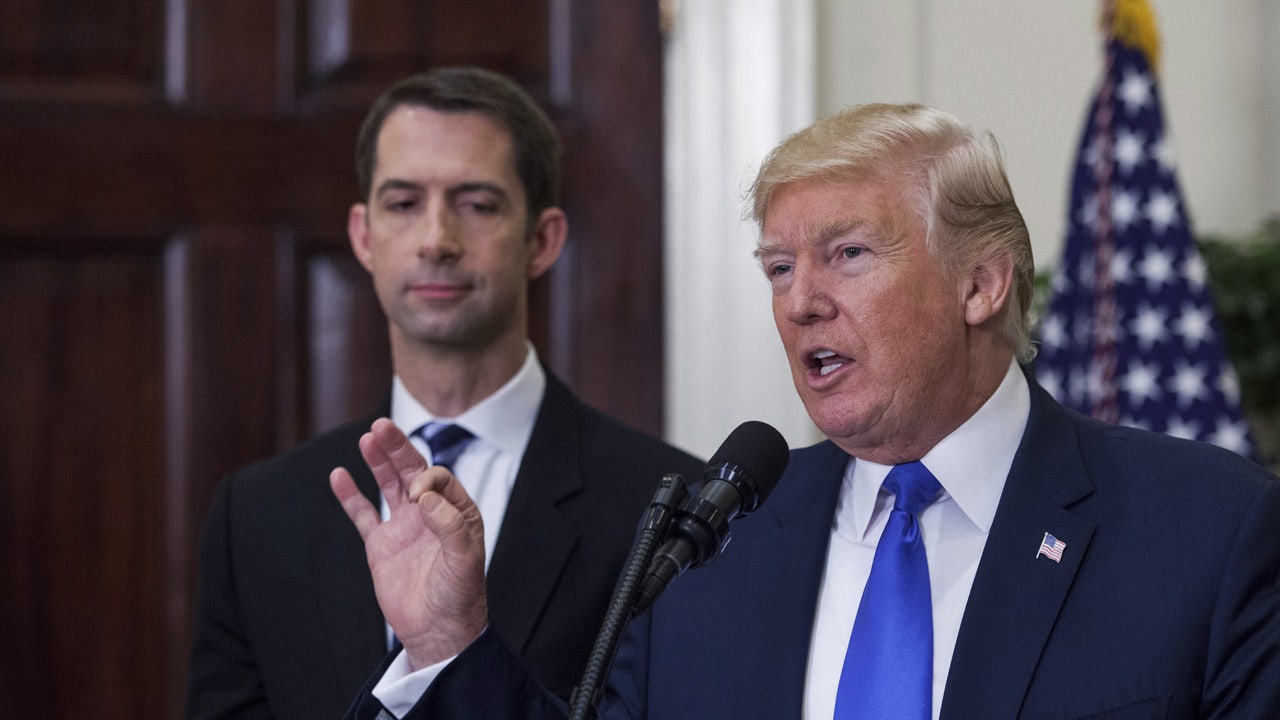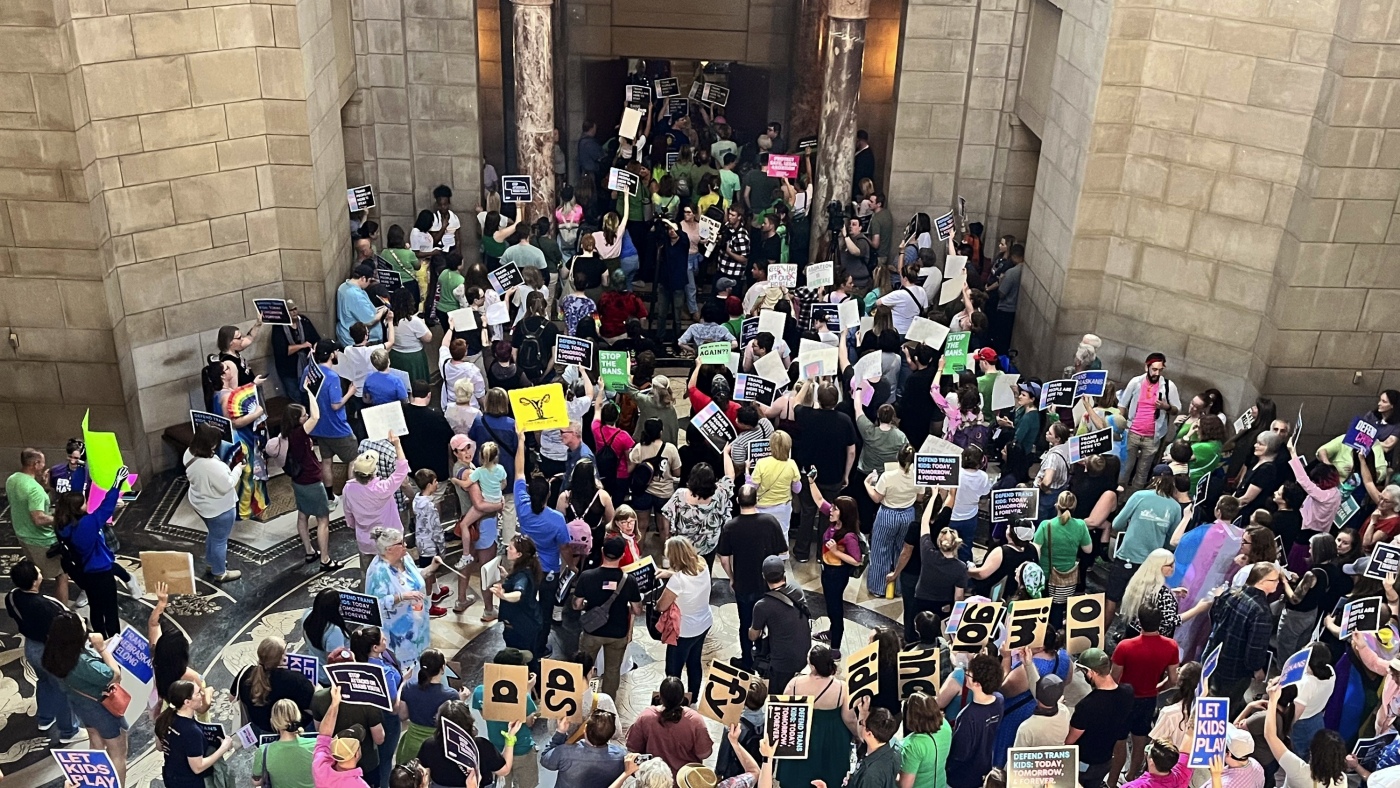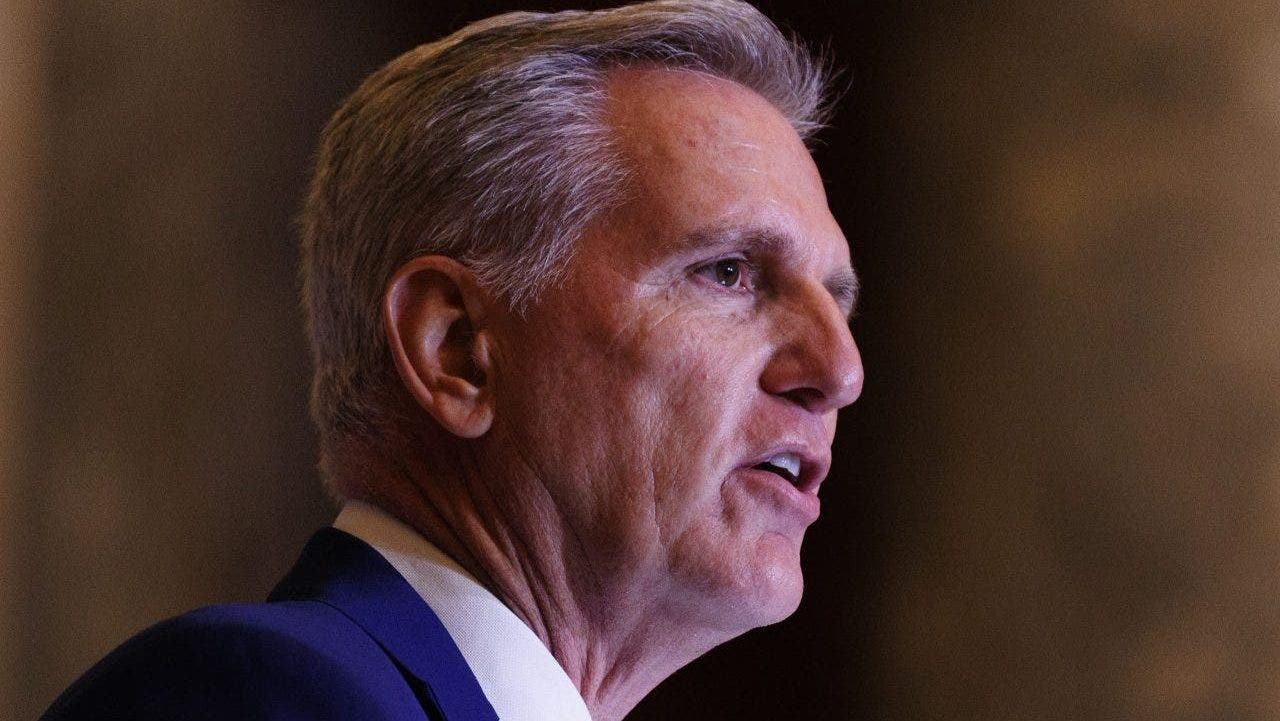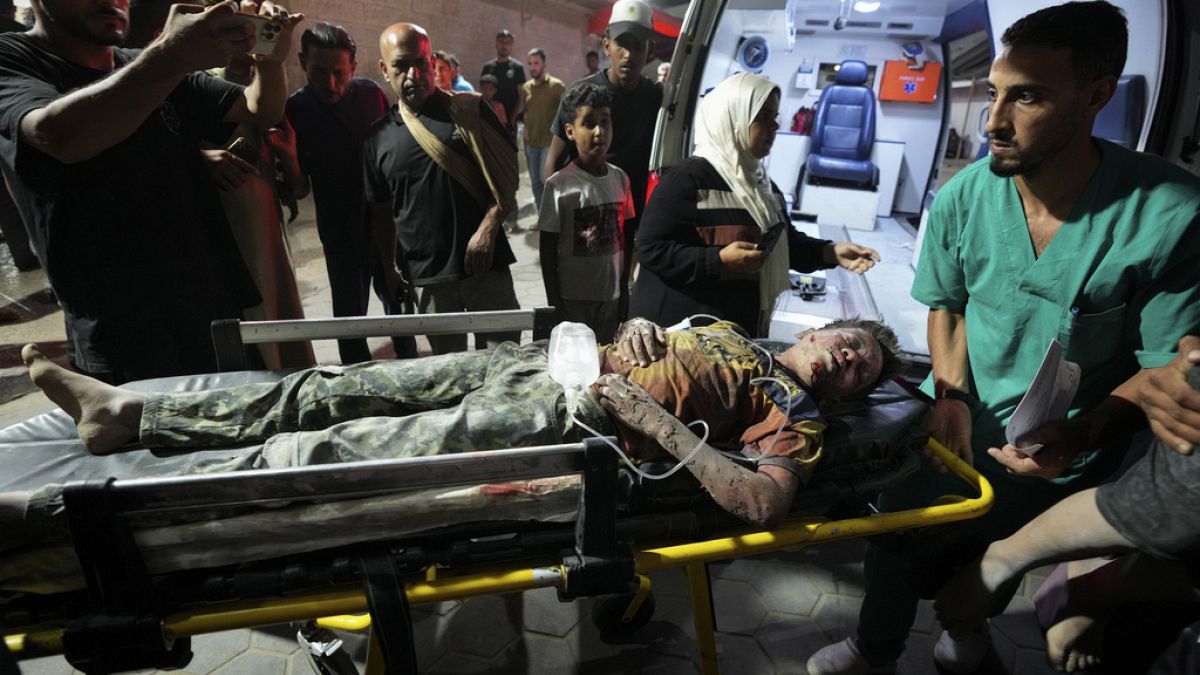World
‘Informed solidarity’: Why thousands hit Kerala streets for Palestinians
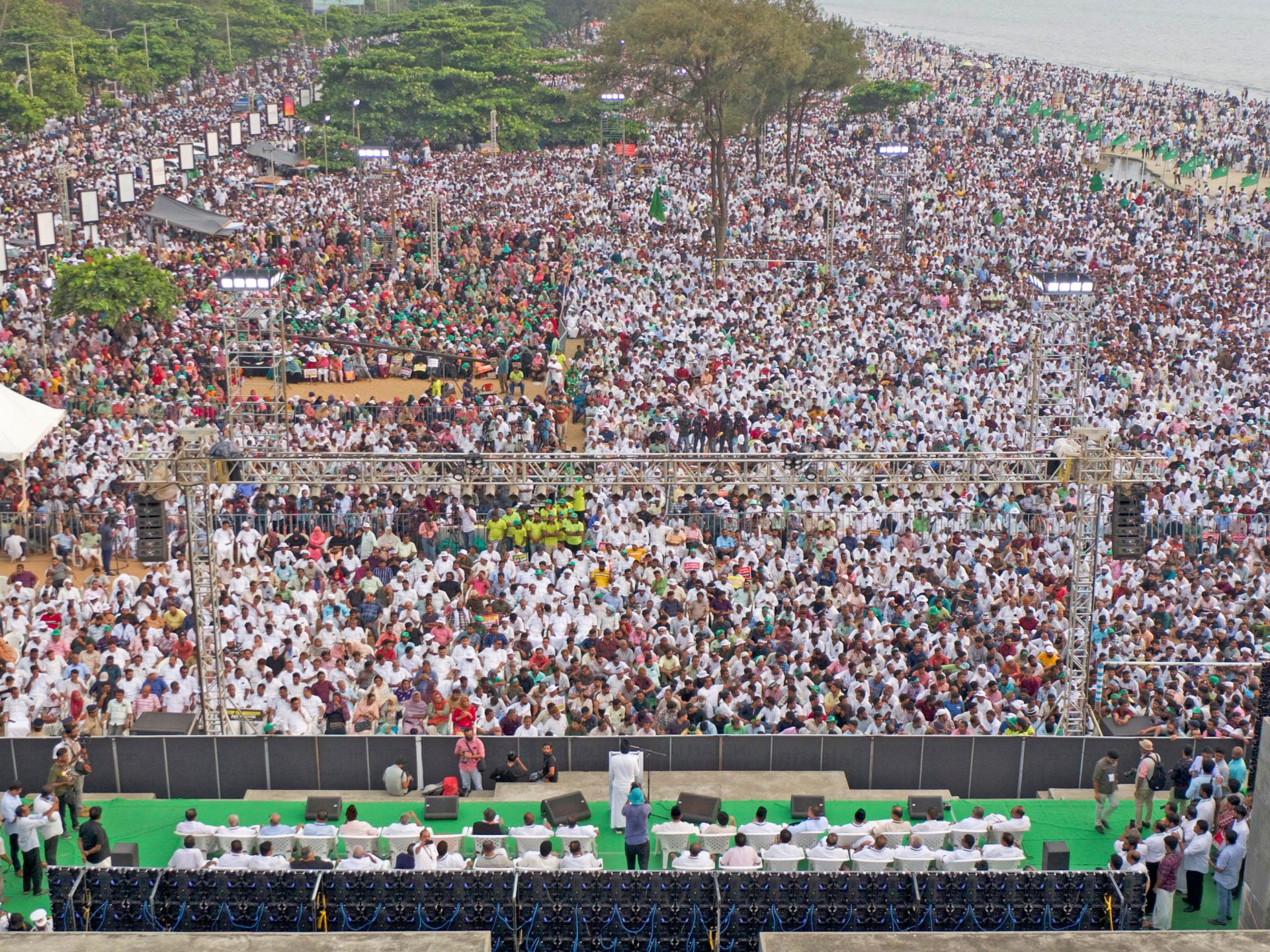
Kozhikode, India – Thousands of kilometres away from the Gaza Strip, which is undergoing what many observers call a “genocide”, people in southern India’s Kerala state are flocking to public spaces to join protests and candlelight vigils in solidarity with the Palestinians.
More than 11,300 Palestinians – half of them children – have been killed in Israeli air strikes and ground attacks on Gaza since October 7 when Hamas, in an unprecedented move, entered Israel and killed 1,200 people, according to official figures.
Israel’s unrelenting and disproportionate killing of civilians and siege on hospitals providing critical care has outraged people across the world, with dozens of solidarity marches held for more than a month now.
In Kerala as well, political parties, rights activists, cultural groups and Muslim organisations have held rallies and events, calling for an immediate ceasefire in the besieged enclave and censoring Israel for its alleged war crimes.
Last week, Kerala’s Chief Minister Pinarayi Vijayan inaugurated one such rally organised by his Communist Party of India (Marxist) and attended by more than 50,000 people cutting across political affiliations in Kozhikode.
The November 11 rally marked the 19th death anniversary of Palestine Liberation Organization (PLO) leader, Yasser Arafat, an icon of resistance against the decades-old Israeli occupation of the Palestinian territories.
In his speech, Vijayan unleashed a scathing attack on Israel and Indian Prime Minister Narendra Modi’s support of the country’s far-right Zionist regime.
“India is the biggest consumer of weapons manufactured in Israel. Indian taxpayers’ money should not be given to kill innocent Palestinian children. So India should scrap all military deals with Israel and sever diplomatic ties with it,” he said.
“Israel is one of the biggest terrorist countries. The Indian government’s decision to abstain from a UN voting that called for a ceasefire in Gaza was shameful. The ‘Zionist’ bias of the current rulers of India was not a surprise at all,” he added.
In response, K Surendran, the Kerala state president of the right-wing Bharatiya Janata Party (BJP), dared Vijayan to condemn Hamas.
“Only bearded moulavis [Muslim preachers] were present on the dais at the [Communist Party of India (Marxist)] rally. This has raised doubts among people that the left-wing party has changed its name to the Communist Party of Moulavis,” he told reporters.
On October 26, Kozhikode also saw the biggest-ever Palestine solidarity march in India, as more than 200,000 people rallied after the regional party, the Indian Union Muslim League, asked them to hit the streets to oppose the war on Gaza.
The Indian National Congress, the main opposition party in the southern Indian state, has also announced a solidarity rally on November 23.
‘Informed society’s solidarity’
So what makes Kerala so sensitive to the Palestinian cause?
“The Palestine issue garners widespread support in Kerala because of the historical connections between the region and West Asia, particularly the Arab world,” KM Seethi, former professor of international relations at Mahatma Gandhi University in Kerala’s Kottayam town, told Al Jazeera.
Seethi said the migration from Kerala to the Gulf beginning in the early 1980s exposed them to the struggles of the Palestinian people, leading to a “natural sympathy” for their cause. Nearly 3.5 million people from the state work in the Middle East, forming a majority of the Indian expats in the region.
But there is more.
In India, which finds itself at the bottom of many human development indices such as education and health, Kerala is an outlier. Its Human Development Index at 0.792 is the highest in India. According to the 2011 census, Kerala’s literacy rate stood at 93.91 percent, as opposed to the national rate of 74 percent.
Long before the Gulf migration began, public intellectuals in Kerala had been following the sociopolitical developments in the tumultuous Arab world.
One such intellectual was Vakkom Mohammed Abdul Khader Moulavi, founder of Swadeshabhimani (The Patriot) newspaper way back in 1905. An expert in West Asian politics, he used his newspaper to educate people about issues concerning Palestine and other parts of the Middle East.
“Such efforts apparently resulted in the publication of the first Malayalam book on Palestine in 1930. Written by journalist and sociopolitical observer Muhammed Kannu, the book, titled Palestine Prashnam (The Palestine Problem), was published 18 years before the formation of Israel and 49 years before Edward Said wrote The Palestine Question in 1979,” M V Bijulal, chairperson of the Centre for West Asian Studies at Mahatma Gandhi University, told Al Jazeera.
Palestine Prashnam, using historical documents, reveals how Britain used Palestine, a former colony, for political gains. The author Kannu was also a member of the editorial board of another newspaper, Al Ameen, founded by Congress leader Mohammed Abdur Rahiman.
“Kerala provides an ideal platform for international political discourses. What we are witnessing in Kerala now is an informed society’s solidarity with the Palestinian cause,” said Bijulal.
In addition, journals published by ideologically opposed Muslim groups in the state also educated the community about Palestine. These organisations, belonging to the Sunni, Salafi and Jamaat-e-Islami persuasions, set aside their theological differences to publish articles condemning the Israeli occupation and its daily attacks, dehumanisation and humiliation of the Palestinian people.
“This helped their followers understand the gravity of the issue,” author and political observer Mujeeb Rahman Kinalur told Al Jazeera.
Not a Muslim issue
But that didn’t mean Palestine was a Muslim issue in Kerala, where 27 percent of its 35 million people are Muslim – nearly twice the national average at around 15 percent, according to the last census conducted in 2011. Christians constitute 18 percent while Hindus form the majority at around 55 percent.
Palestine, however, remains a non-divisive issue in the state, mainly due to an unambiguous stand on it by its prominent political parties – the Indian National Congress, its closest ally the Indian Union Muslim League, and the Communist Party of India (Marxist).
All these parties have criticised the federal Hindu nationalist government, led by Prime Minister Narendra Modi’s Bharatiya Janata Party (BJP), for supporting Israel and abstaining from a recent United Nations vote calling for a ceasefire in Gaza. In his social media posts and speeches, Modi has repeatedly called Israeli leader Benjamin Netanyahu a “close friend” while his government has built close business and strategic India-Israel ties.
MA Baby, a senior Communist Party of India (Marxist) leader, said iconic Indian freedom fighter Mahatma Gandhi and the country’s first Prime Minister Jawaharlal Nehru believed that Palestinians were waging an independence movement, much like what the Indians did against the colonial British.
“By supporting Palestine, [the] people of Kerala are taking a leaf out of India’s freedom struggle. Modi might have conveniently forgotten the sacrifices of our tallest leaders, but we would continue to emulate them,” he told Al Jazeera.
“The issue here is the liberation of Palestine. It is not a Muslim issue at all.”
The Indian Union Muslim League’s Panakkad Sayyid Sadiq Ali Shihab Thangal said only “the wicked minds” would see the Palestinian struggle as a Muslim issue. “People from different faiths live in Palestine and they are engaged in a fight for their land. We stand by them. Religion is not an issue here.”
Congress leader VT Balram told Al Jazeera his party has historically denounced Israel’s occupation of Palestine. “It is the stated policy of Congress since the Nehru era. Hence we vehemently oppose Narendra Modi government’s decision to support Israel in the ongoing war,” he said.
In the past decades, the people of Kerala had come out in support of Nelson Mandela in his fight against South Africa’s apartheid regime or the people of Vietnam in their war against the United States and France. The state sent millions of tonnes of food and medicine to Cuba when it was put under sanctions by the US in the early 1990s. During the US invasion of Iraq in 2003, the state witnessed several anti-war rallies.
In fact, Arafat remains one of the most revered personalities in Kerala.
“In the 1950s and 1960s, photos of Yasser Arafat adorned the walls of many Communist party offices in Kerala, along with [Karl] Marx and [Frederick] Engels. It showed the [people of Kerala’s] strong anti-imperialist stand,” Bijulal told Al Jazeera.

World
Access to Aid in Gaza Was Dire. Now, It’s Worse.

The flow of aid into Gaza has shrunk so much in May that humanitarian officials say their operations are at risk of shutting down, and that the threat of widespread starvation is more acute than ever.
Aid trucks entering Gaza fall far short of meeting need
The entry of aid trucks through Gaza’s southern crossings, where most aid has arrived since the war began, has nearly ground to a halt since Israel expanded its fighting in the southern city of Rafah. In northern Gaza, new entry points have enabled small amounts of critical aid to reach those who have been most at risk of famine for months. But that aid is insufficient to support the Gazan population, and most cannot reach the central and southern areas, where a majority of people are newly displaced by the war.
A ruling issued by the International Court of Justice on Friday appeared to order Israel to halt its military offensive in Rafah, although at least some of the court’s judges said limited operations could continue despite the decision. The ruling made explicit note of the “spread of famine and starvation” in Gaza and emphasized the need for “the unhindered provision at scale by all concerned of urgently needed basic services and humanitarian assistance.”
Last month, Israel had pledged to increase the aid it allowed into Gaza after the killing of seven World Central Kitchen workers in an attack by Israeli forces drew international outrage. Israel’s strict controls on aid and the challenge of distributing it within the enclave had already created catastrophic levels of hunger.
Under pressure from President Biden, Israeli officials began to bring additional aid through the port of Ashdod and opened the Erez crossing in the north, which Israel had closed after the Hamas attacks on Oct. 7. In coordination with Israel, the U.S. military built a temporary pier to bring in aid by sea, a supplement to key land routes in the south.
But in early May, Israel expanded its military operation in southern Gaza after a Hamas rocket attack killed four soldiers near a crossing at Kerem Shalom. Israel closed that crossing as well as the Rafah crossing, where a majority of aid had been coming in. Nearly 300 aid trucks had crossed there in a single day just before the incursion.
“It was a record for us since the outbreak of the war,” said Georgios Petropoulos, the head of the United Nations aid office in Rafah. “We were kind of saying, ‘OK, well, maybe we’re getting to where we need to be.’ And then boom, suddenly it’s gone.”
Aid entrypoint
Current status
Rafah crossing
The crossing remains closed after it was seized and shut down by Israel during its incursion into Rafah.
Kerem Shalom crossing
Israel reopened this southern crossing on May 8, but a very limited amount of aid and fuel, and almost no medical supplies, have entered there since.
Erez and Erez West crossings
More aid has come through these crossings, which have been open since early May, than through others since May 8, but the amounts satisfy just a fraction of the overall need.
U.S.-built aid pier
The U.N. said on Wednesday that about 60 trucks’ worth of food has been delivered to warehouses via the pier, less than the U.S. military’s goal. Aid groups temporarily suspended distribution last week after security issues.
Airdrops
A few trucks’ worth of aid enters by air sporadically.
Israel reopened Kerem Shalom on May 8, but aid workers from multiple organizations have said the vital entry point remains functionally closed, with a daily average of just eight aid trucks entering. One reason is that Egypt has refused to allow trucks from the closed Rafah crossing to continue on to Kerem Shalom.
Mr. Biden and President Abdel Fattah al-Sisi of Egypt agreed on Friday to send aid and fuel to Kerem Shalom until the Rafah border crossing could be reopened. On Sunday, 126 trucks carrying food and other aid from Egypt reached that crossing, according to a statement by the Israeli military. The U.N. distribution trucks that made it to Kerem Shalom to pick up the Egyptian aid were forced to evacuate the crossing because of a security issue, said Sam Rose, a spokesman for the United Nations Relief and Works Agency for Palestine Refugees, or UNRWA. Officials including Mr. Rose said the aid had not made it past the crossing as of Sunday.
Scott Anderson, a senior official at UNRWA, and Mr. Petropoulos have said that the crossing area is still an active military zone and that safety and logistical challenges can hold up aid that arrives at the crossing and prevent it from being immediately collected and distributed. An Israeli airstrike on a makeshift tent camp in Rafah killed at least 45 people on Sunday night, according to the Gaza health ministry. The Israeli military said the strike was aimed at a Hamas compound.
Empty trucks coming from inside Gaza en route to load aid at Kerem Shalom often sit in hours-long waits behind commercial trucks carrying goods to sell in Gaza, which officials say number more than 100 or 200 per day. While humanitarian groups say they welcome the arrival of commercial supplies, most people inside Gaza cannot afford them, and the shipments may not include basic necessities.
Getting aid to people in Gaza is also difficult because Israel’s expanded operations in the south and north have forced nearly a million people to flee to areas with little shelter, food or water on the coast or among the rubble in more central regions.
Before the Rafah operation, most people were sheltering in the areas where a majority of the aid was coming in. But now, new entry points in the north — the U.S. pier, and a new crossing called Erez West — are beset with problems. They bring in too little aid to sustain everyone and are located far from the largest clusters of people.
Before the Rafah operation
April 23 through May 6After the Rafah operation
May 7 through May 20
The distribution of the aid that does make it through each crossing also poses significant challenges. Israel’s recent evacuation orders in parts of Rafah and northern Gaza have made many aid agency warehouses unreachable and travel more dangerous. UNRWA announced on May 21 that it had suspended distribution in Rafah, citing security issues, supply shortages and an inability to access its warehouse.
Without consistent, predictable deliveries of aid, many trucks do not make it far through desperate crowds. For instance, on May 18, the World Food Program reported that 11 of 16 trucks were looted after leaving the U.S. pier.
An Israeli military road and checkpoint in the north, which bisects the enclave and prevented the easy movement of aid from the south to the north earlier in the war, is likely to create a similar problem for aid moving in the opposite direction, according to Mr. Petropoulos.
COGAT, the Israeli military agency coordinating aid delivery, has said that increasing the amount of aid going into Gaza remains a priority. It reports daily that it has inspected hundreds of trucks and coordinated their transfer to border crossings, though the figures are often higher than those reported by aid organizations, which track the number of trucks that have collected goods for entry into Gaza and exclude trucks carrying commercial goods.
Neither set of figures accounts for difficulties in distribution that can prevent aid from getting to Gazan civilians. Israel says enough aid is entering Gaza and has blamed aid groups for not distributing it faster to civilians — a characterization the aid groups dispute, saying Israeli forces have made distribution extremely difficult.
Aid organizations have also warned that they will be unable to deliver supplies to anyone if they run out of fuel, and that already inadequate amounts of safe water supplies will disappear. At least 200,000 liters of fuel are needed daily, according to Mr. Anderson of UNRWA. But just a quarter of that amount arrives on average each day since the closure of Rafah crossing, according to U.N. data.
“The fuel limitation means that we often have to choose: Do we keep the generators running at the hospital, the bakery or the sewage plant?” Mr. Anderson said.
Methodology
Daily truck counts were compiled from multiple sources, including the U.N. dashboard for southern border crossings, meeting minutes from the inter-agency Logistics Cluster, World Food Program reports and updates from COGAT, the Israeli military agency coordinating aid delivery. The counts were cross-checked with multi-date aid truck totals from the U.N. Office for the Coordination of Humanitarian Affairs and the Office of the Spokesperson for U.N. Secretary-General. Daily averages were calculated for the northern crossings from May 12 to May 15, as only a total count for that span of dates was available. Trucks carrying commercial goods are excluded.
Maps compare aid truck inflows over the two weeks before the Rafah operation and the two weeks after. Population estimates are based on reports by the United Nations, the Palestinian Central Bureau of Statistics and preliminary, internal estimates from aid organizations in Gaza. Estimates are based on satellite imagery analysis, field observations and shelter registrations, and are subject to change.
World
Egyptians, IDF exchange gunfire at Rafah border crossing: reports
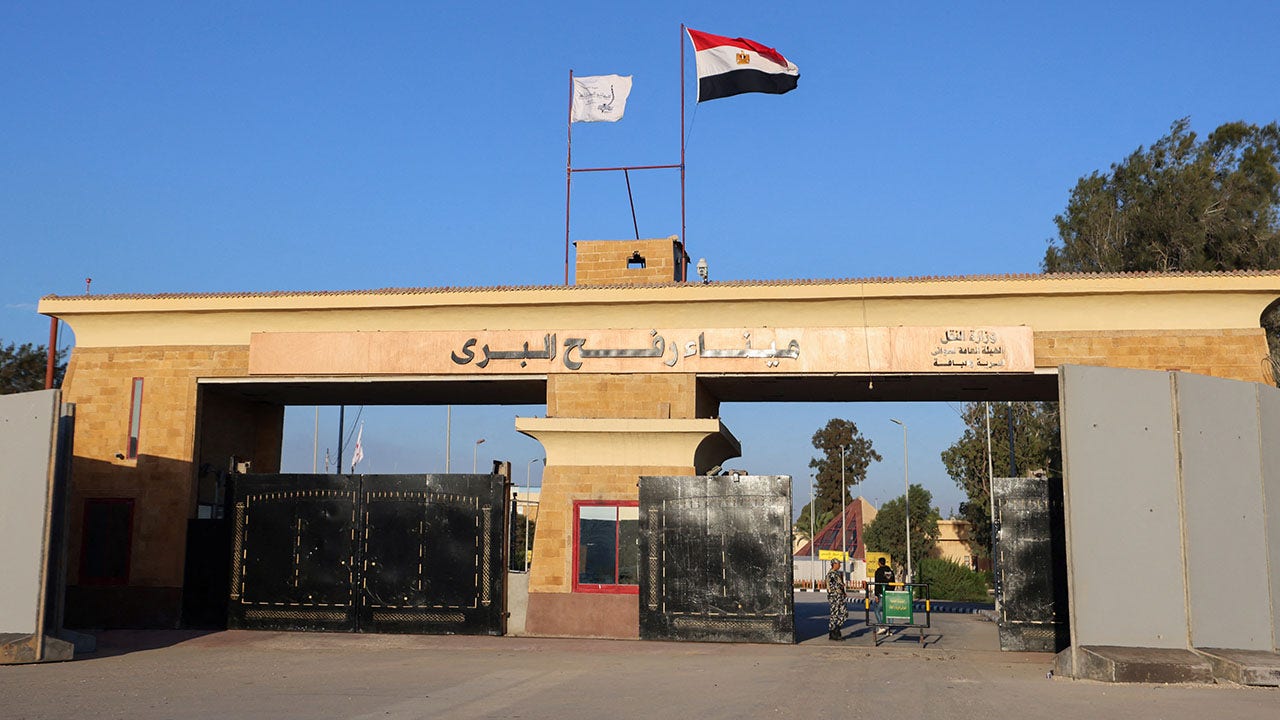
Egyptian service members and Israeli Defense Forces exchanged gunfire Monday at the Rafah border crossing along the Gaza Strip, the Times of Israel is reporting.
Other Israeli media outlets are reporting that an Egyptian soldier was killed Monday during the incident.
The Israel Defense Forces said “a shooting incident occurred on the Egyptian border” and that the “incident is under review and discussions are being held with the Egyptians.”
The gunfight comes just hours after an Israeli airstrike on a Hamas compound in Rafah killed two top Hamas officials as well as dozens of civilians.
‘SQUAD’ MEMBER RASHIDA TLAIB CALLS BIDEN ‘ENABLER’ OF GENOCIDE AT CONFERENCE LINKED TO TERRORIST GROUP, CCP
The Rafah border crossing between Egypt and the Gaza Strip in November 2023. (Reuters/Mohamed Abd El Ghany)
While the exact number of killed remains unclear at this time, the IDF confirmed that it struck a Hamas compound in which “significant Hamas terrorists were operating.”
The IDF said it carried out the strike “against legitimate targets under international law.”
IDF sources told Fox News Digital the strike eliminated Yassin Rabia, the commander of Hamas’ leadership in Judea and Samaria, as well as Khaled Nagar, a senior official in Hamas’ Judea and Samaria wing.
The IDF said both men had perpetrated numerous terrorist attacks in the early 2000s in which Israeli civilians and soldiers were killed.
The IDF acknowledged reports that “several civilians in the area were harmed” from the airstrike and a subsequent fire. It said incident is “under review” as well.
ISRAELI AIRSTRIKE ON RAFAH KILLS 2 TOP HAMAS COMMANDERS, DOZENS OF CIVILIANS

Fire rages following an Israeli airstrike in Rafah in the southern Gaza Strip on Sunday, May 26. (Reuters/Reuters TV TPX Images of the Day)
Last week, the United Nations’ top court issued an order demanding Israel “immediately halt its military offensive” against Hamas in Rafah, the Palestinian terrorist group’s final stronghold in the Gaza Strip.
“The military ground offensive in Rafah, which Israel started on 7 May 2024, is still ongoing and has led to new evacuation orders,” the International Court of Justice said in its ruling. “As a result, according to United Nations reports, nearly 800,000 people have been displaced from Rafah as of 18 May 2024.”
It added that the “immense” humanitarian risks “associated with a military offensive in Rafah have started to materialize and will intensify even further if the operation continues.”
But Israeli government spokesperson Avi Hyman, when asked about the ICJ order on Friday, declared, “No power on earth will stop Israel from protecting its citizens and going after Hamas in Gaza.”
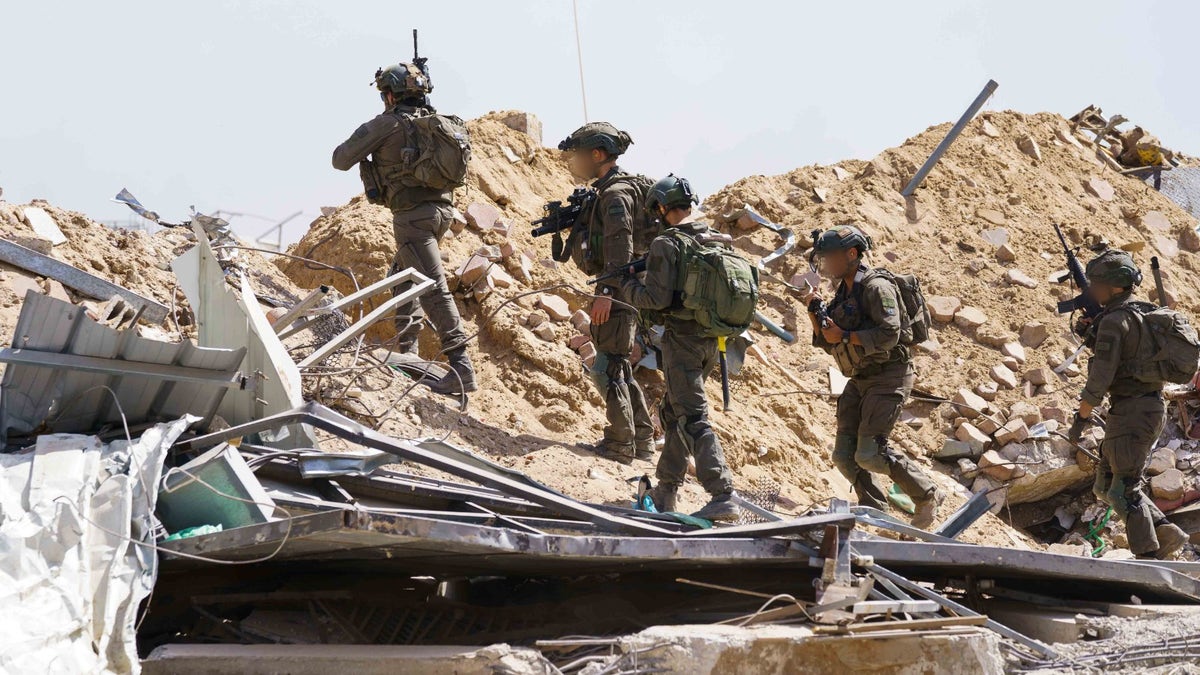
The IDF says its “troops are continuing operations against terror targets in the area of Rafah.” (IDF Spokesman’s Office)
“We will destroy Hamas, we will return peace and security to the people of Israel and to the people of Gaza,” Hyman added. “We cannot go on with a genocidal terrorist regime on our southern border.”
Fox News’ Bradford Betz and Trey Yingst contributed to this report.
World
Former German soldier jailed for spying for Russia

Duesseldorf court sentences ex-soldier to three and a half years in jail for sharing secret military information with Russia.
A former German soldier has been sentenced to three and a half years in jail for sharing secret military information with Russia in the wake of the outbreak of war in Ukraine.
A court in Duesseldorf had found the defendant, named only as Thomas H, guilty of passing on information on his initiative from his post in the military procurement service.
In handing the sentence on Monday, judges noted that Thomas had no prior offences on his record, had not benefitted materially from helping Russia and was in poor health at the time he did so.
The 54-year-old had admitted the crime during his trial, claiming he was hoping to obtain information in return that would help him get his family to safety in time in the event of the conflict escalating into a nuclear war.
The espionage case is one of several uncovered in Germany since Russia’s invasion of Ukraine in February 2022.
Prosecutors had accused Thomas of photographing old training documents related to munitions systems and aircraft technology and dropping the material through the letterbox of the Russian consulate in Bonn.
The defendant “approached the Russian general consulate in Bonn and the Russian embassy in Berlin and offered his cooperation” in May 2023, prosecutors said.
“He passed on information he had obtained in the course of his professional activities for it to be passed on to a Russian intelligence service.”
‘Stupid idea’
Thomas admitted at the opening of his trial in April that the accusations against him were “broadly” accurate. “It was wrong. I stand by that,” he said.
He said his concern about a possible escalation in the war in Ukraine led him to reach out to the Russian side.
More precisely, he was worried about the possibility that deliveries of heavy weapons systems by Berlin to Ukraine would draw Germany into the conflict.
Thomas also indicated he had become dissatisfied with the government and a perceived lack of concern for the safety of German citizens.
He cited complaints over his health after many hard years working for the army and long-term side effects from the coronavirus vaccine.
His various worries led him into a “vicious circle”, he said, adding that he could no longer justify his actions to himself.
Until his arrest in August 2023, Thomas had been a career soldier, working at the army’s equipment, information technology and in-service support department.
The department, which has about 12,000 employees, has seen its workload increase substantially since the outbreak of the Ukraine war as the government stages a wide-ranging overhaul of the army after years of neglect.
Germany has been on high alert for Russian spies against the backdrop of the war in Ukraine and soaring tensions between Moscow and the West.
In April, German authorities arrested two German-Russian dual nationals on suspicions that they were plotting sabotage attacks on the United States military sites in the country to undermine Western military support for Ukraine.
Russian authorities for their part have levelled treason charges against dozens of people accused of aiding Ukraine and the West since the invasion.
-

 Movie Reviews1 week ago
Movie Reviews1 week ago‘The Substance’ Review: An Excellent Demi Moore Helps Sustain Coralie Fargeat’s Stylish but Redundant Body Horror
-

 Politics1 week ago
Politics1 week agoTrump predicts 'jacked up' Biden at upcoming debates, blasts Bidenomics in battleground speech
-
/cdn.vox-cdn.com/uploads/chorus_asset/file/24038601/acastro_STK109_microsoft_02.jpg)
/cdn.vox-cdn.com/uploads/chorus_asset/file/24038601/acastro_STK109_microsoft_02.jpg) Technology1 week ago
Technology1 week agoMicrosoft’s Surface AI event: news, rumors, and lots of Qualcomm laptops
-

 World1 week ago
World1 week agoIndia’s biggest election prize: Can the Gandhi family survive Modi?
-

 News1 week ago
News1 week agoA bloody nose, a last hurrah for friends, and more prom memories you shared with us
-

 Finance1 week ago
Finance1 week agoSan Bernardino finance director claims she was fired after raising concerns about costly project
-

 News1 week ago
News1 week agoVideo: A Student Protester Facing Disciplinary Action Has ‘No Regrets’
-

 World1 week ago
World1 week agoPanic in Bishkek: Why were Pakistani students attacked in Kyrgyzstan?















